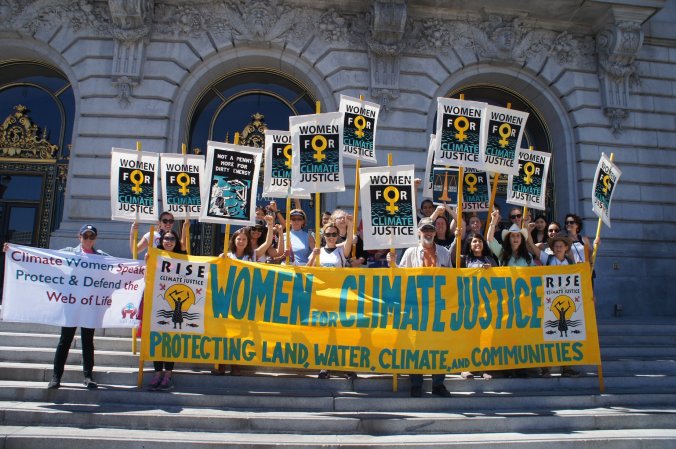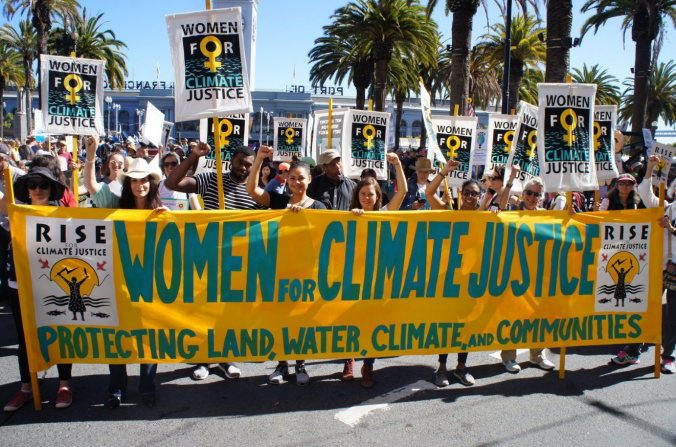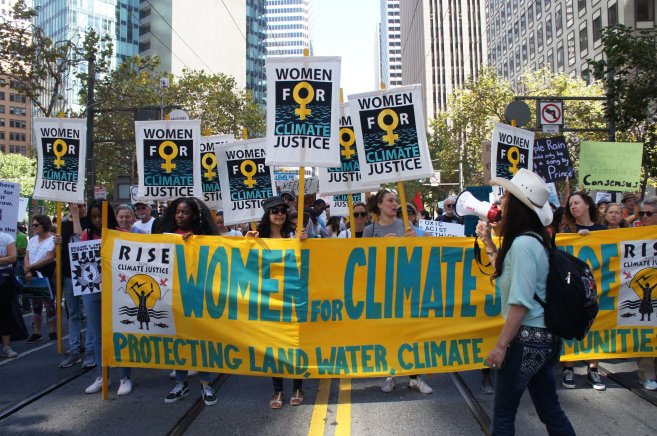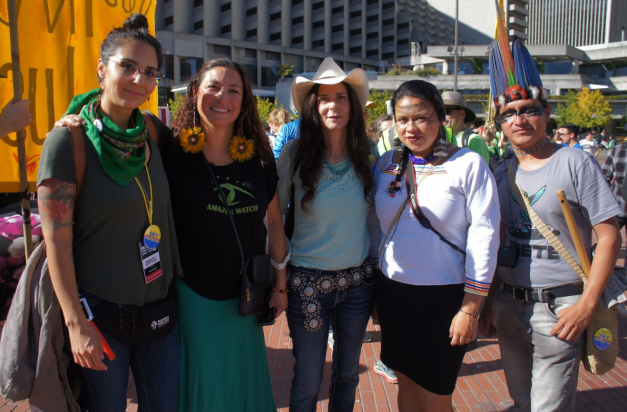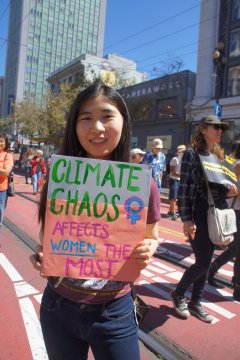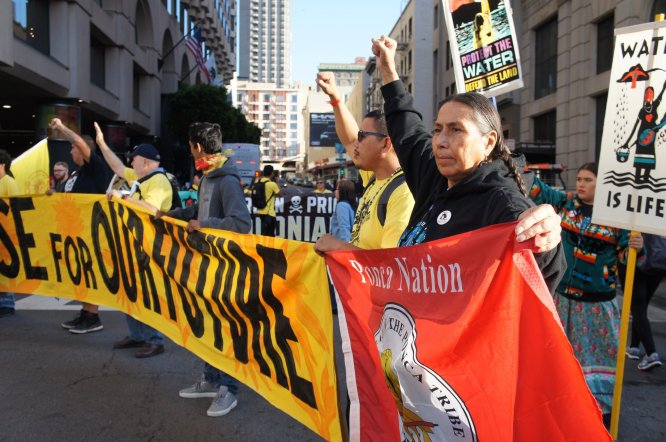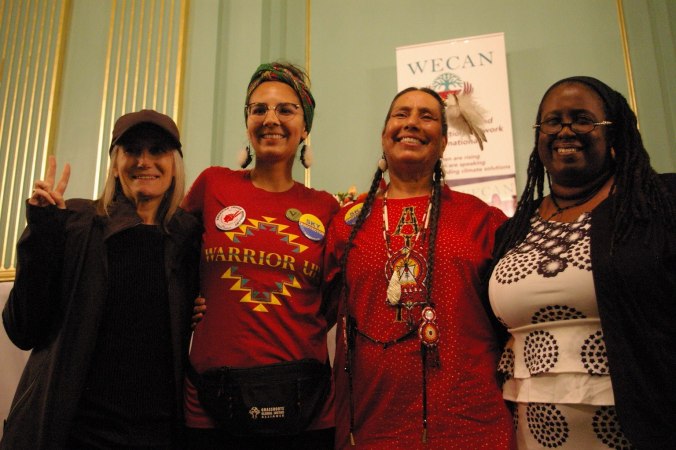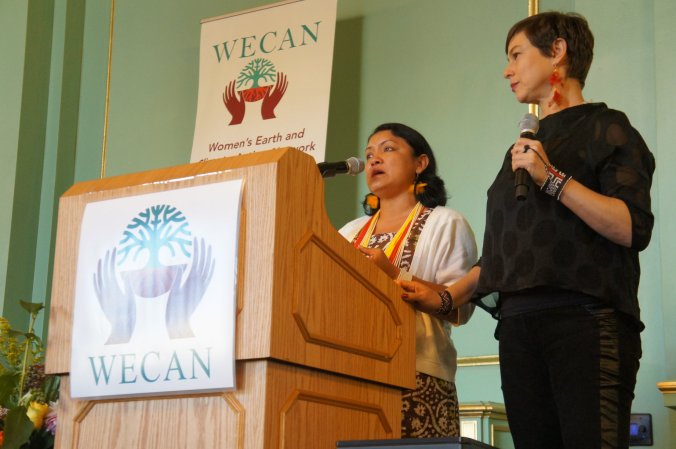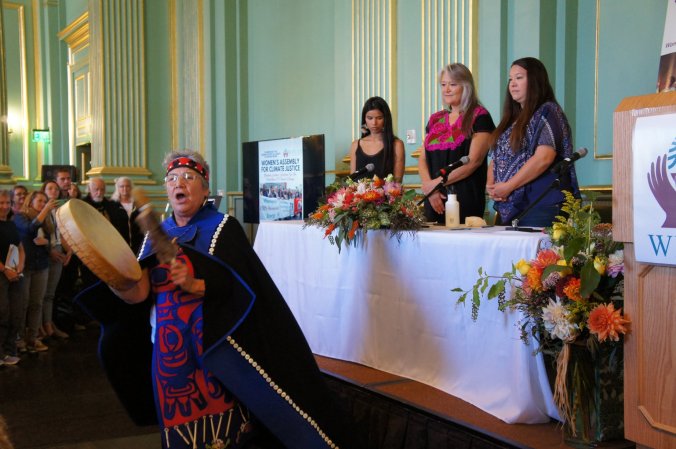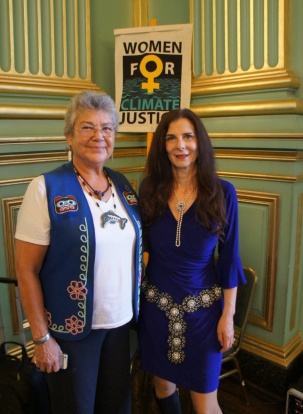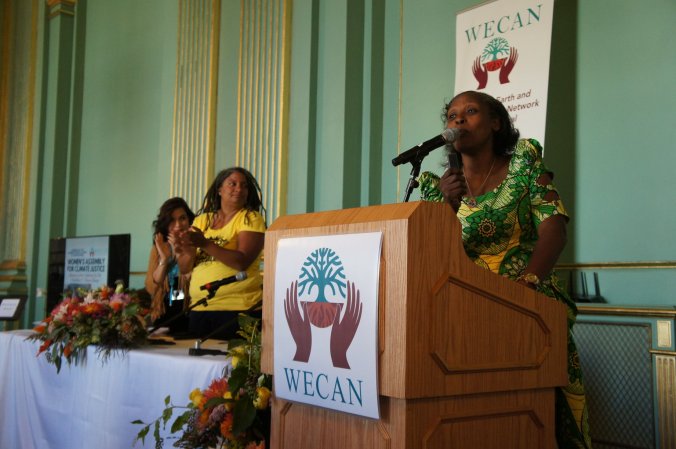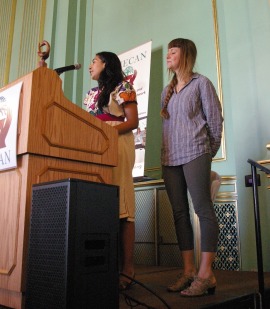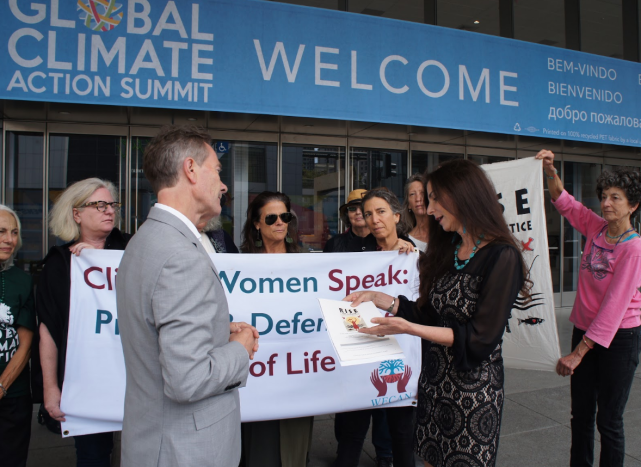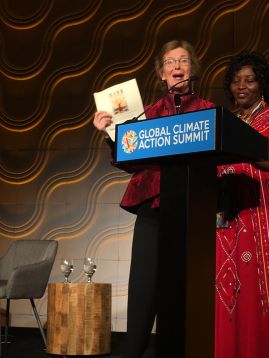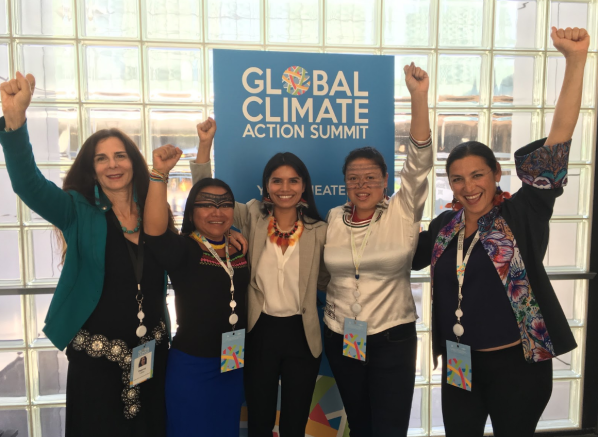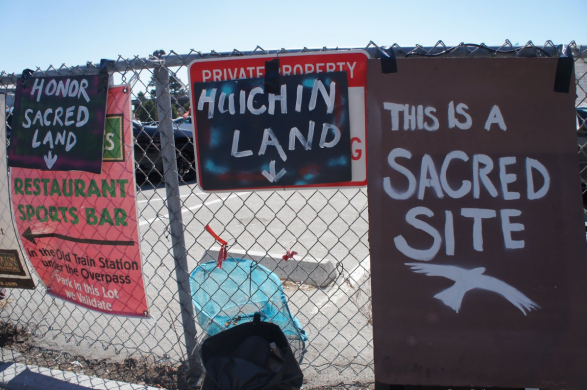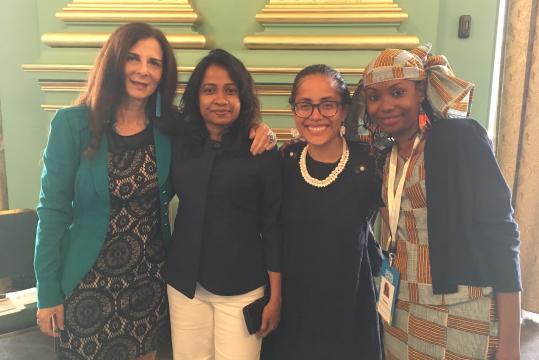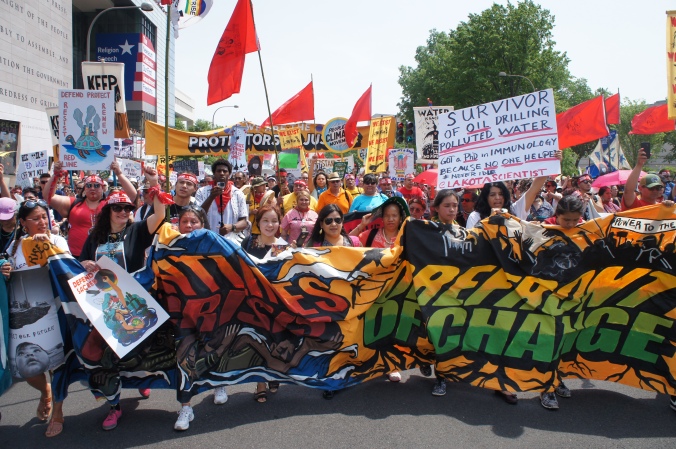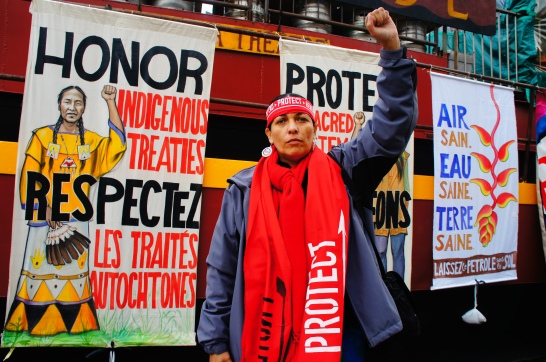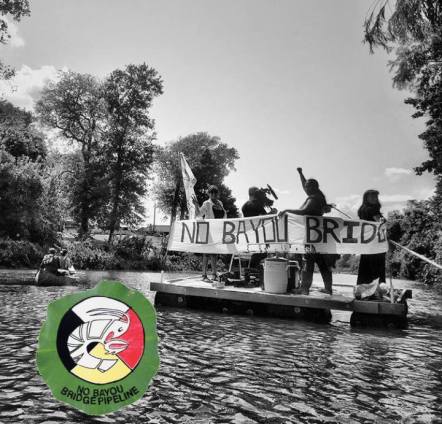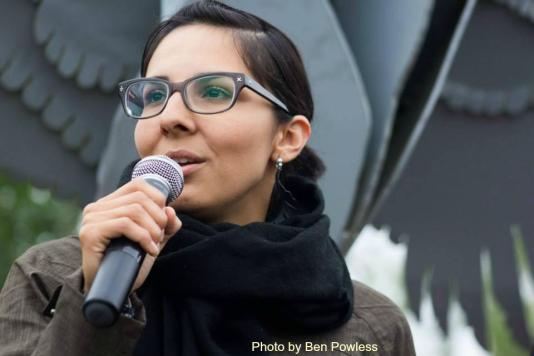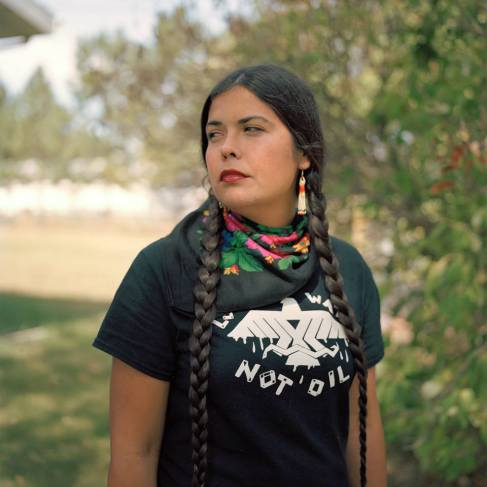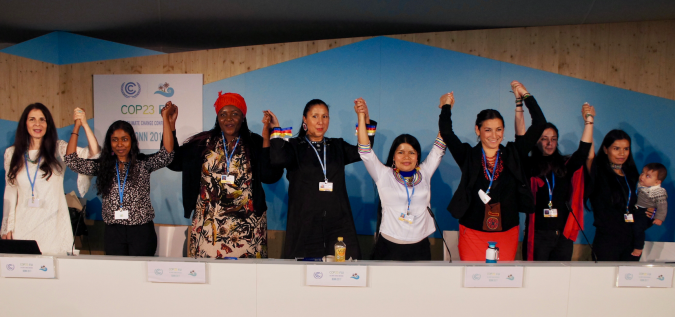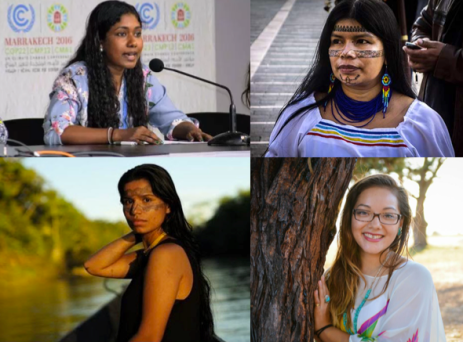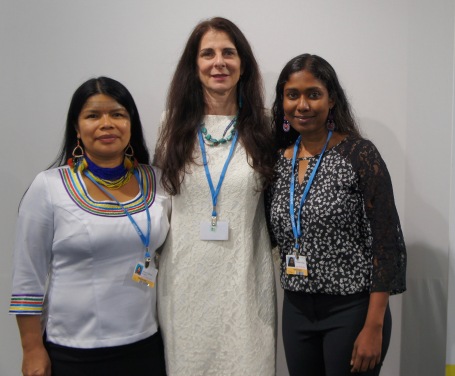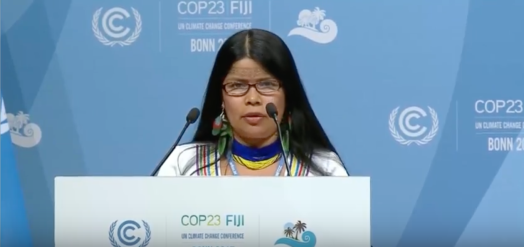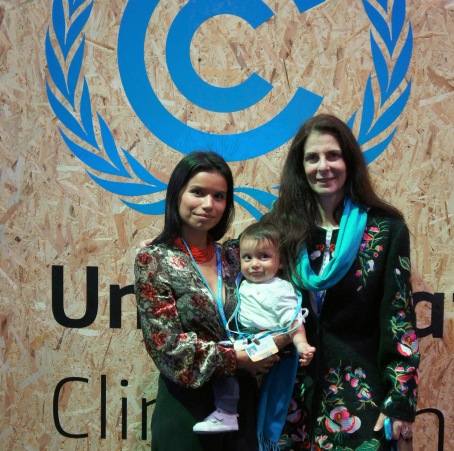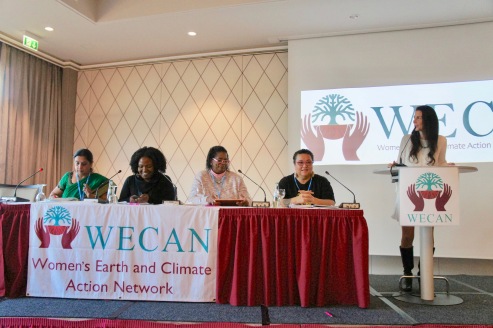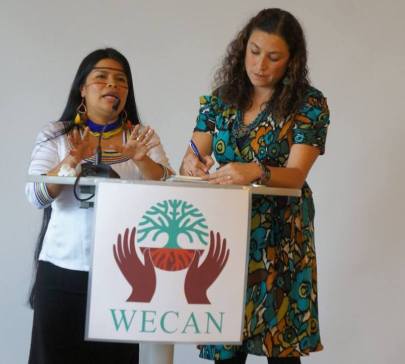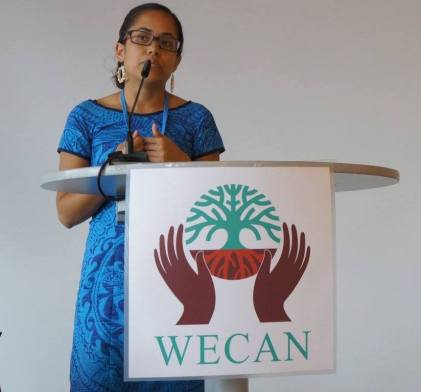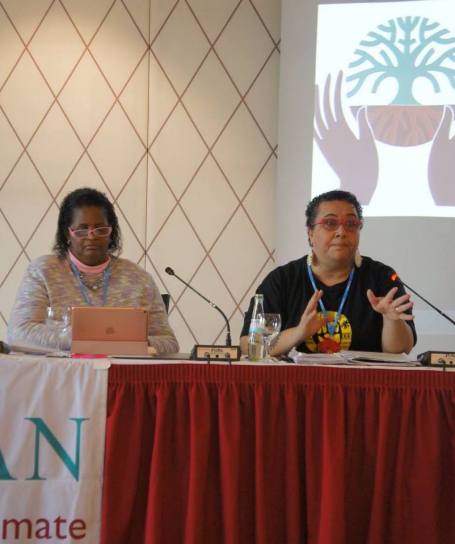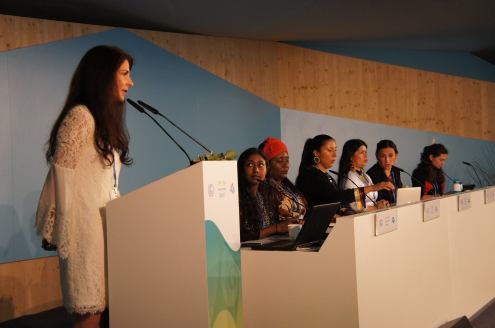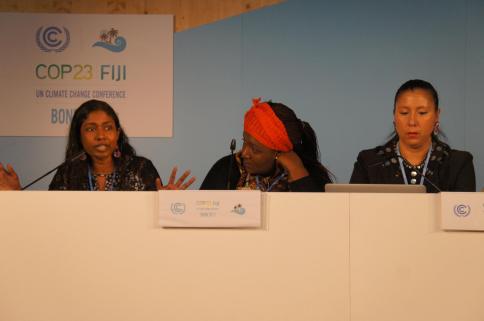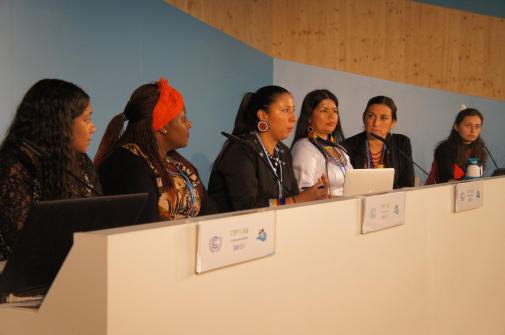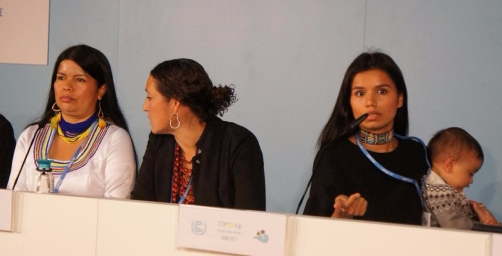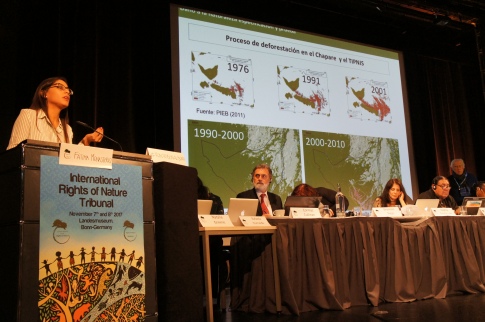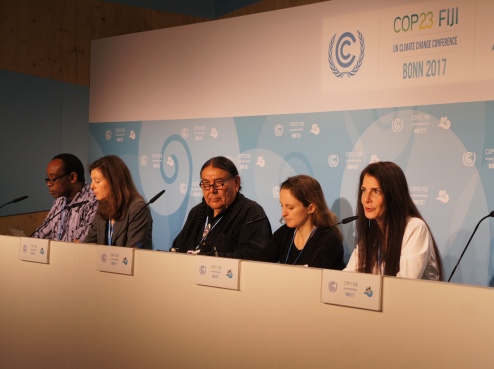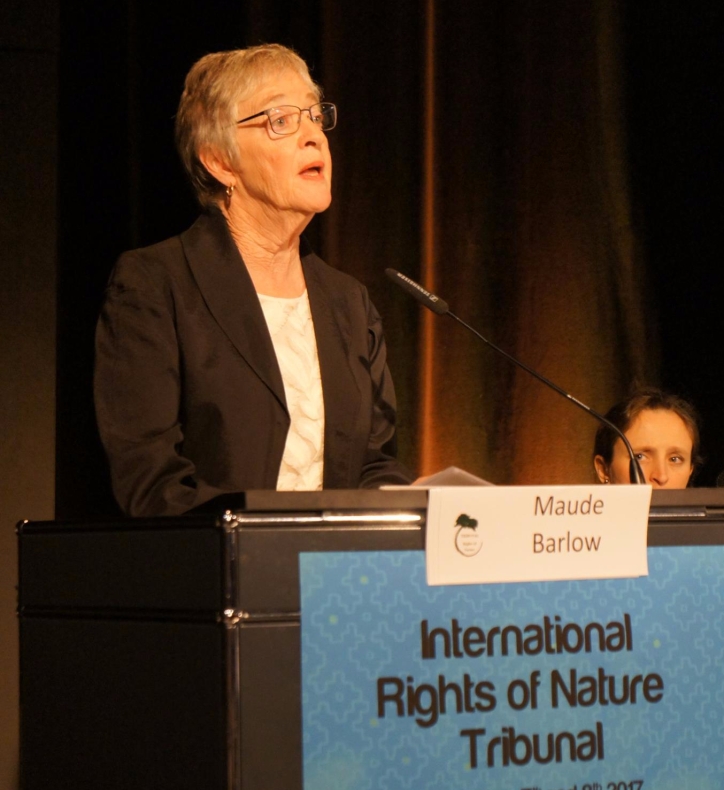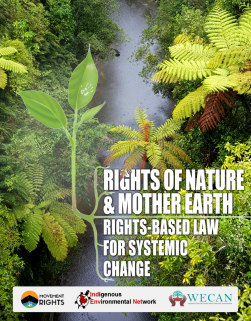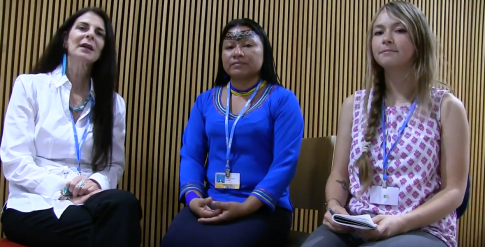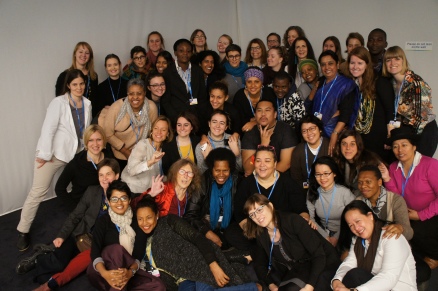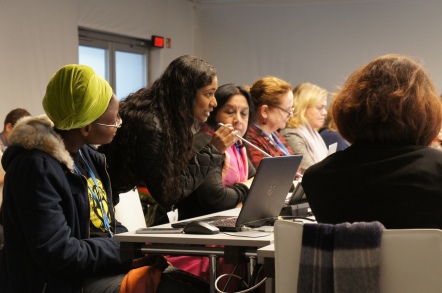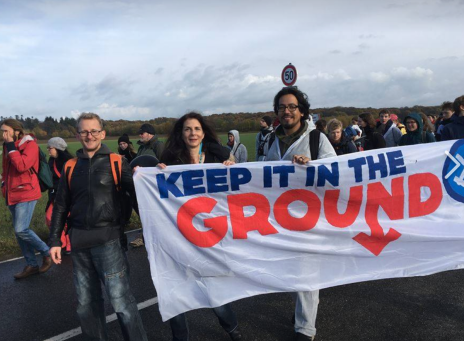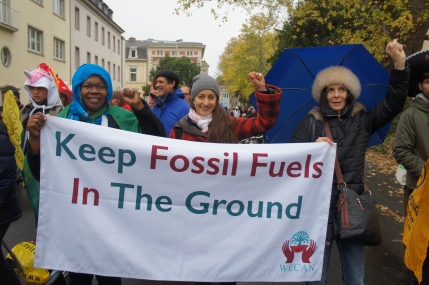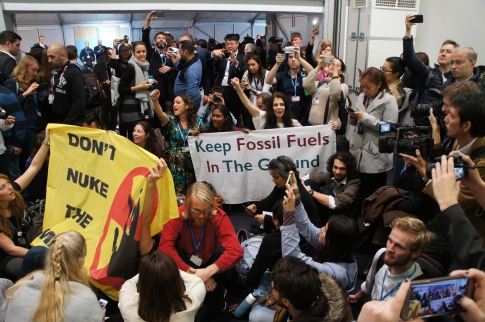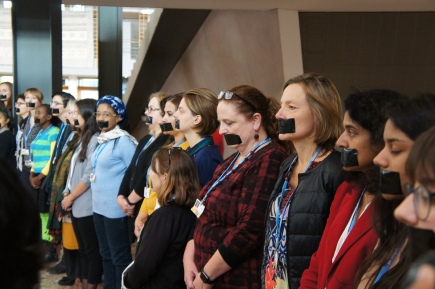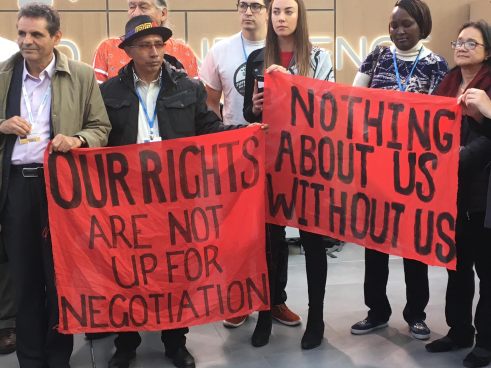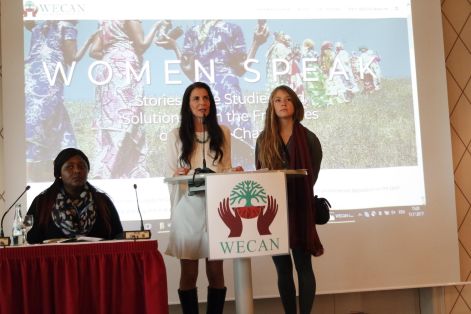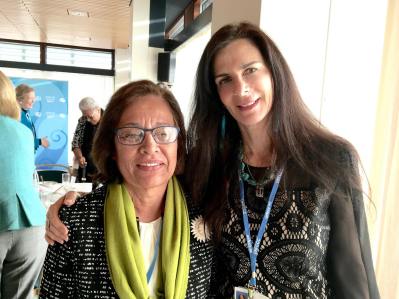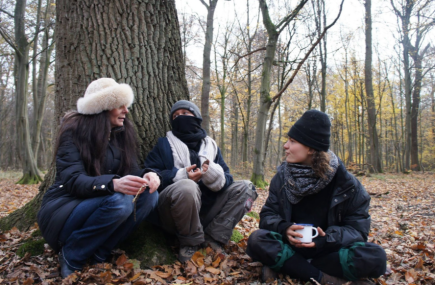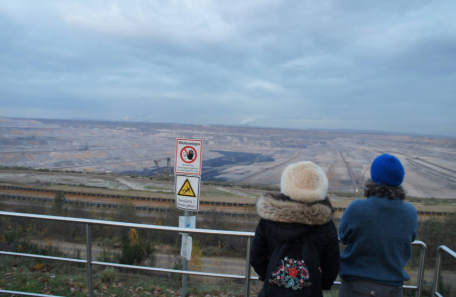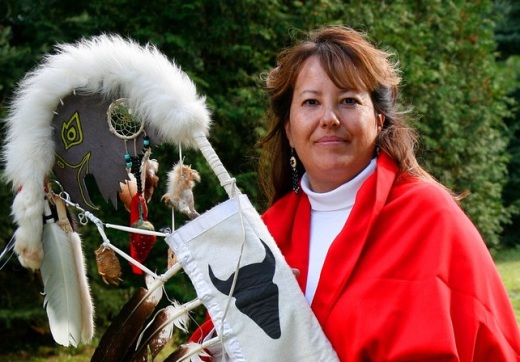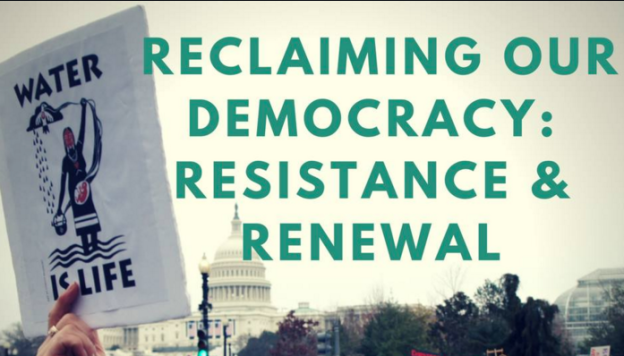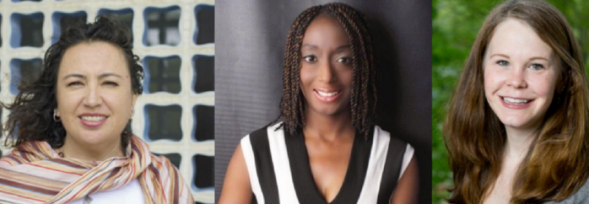By Elaine Colligan, WECAN International COP24 Delegate
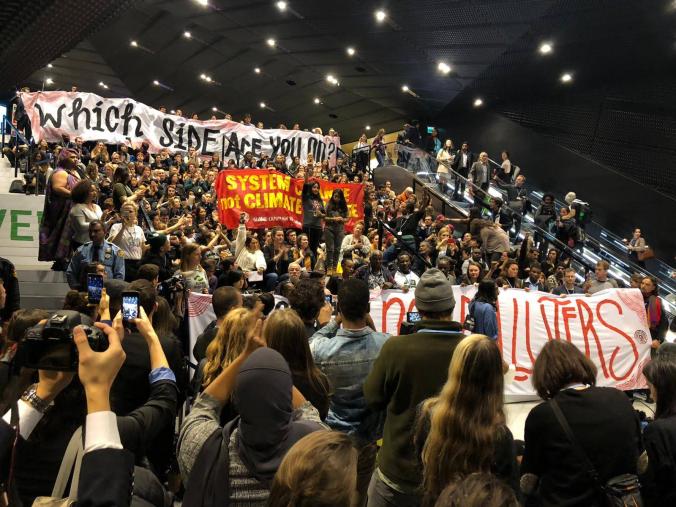
Mass civil society action on the final day of COP24 – Photo by Shaila Shahid
“We have not come here to beg the world leaders to care for our future. They have ignored us in the past and they will ignore us again. We have come here to let them know that change is coming whether they like it or not. The people will rise to the challenge. And since our leaders are behaving like children, we will have to take the responsibility they should have taken long ago.” – Greta Thunberg, 15 years old, Sweden
“We, women, we carry our temples in our wombs. Our bodies are our own territories. Our veins are rivers, rivers that pump blood through our bodies. Our fight is for our own lives, for our own kids, for our own people. For the forests, for the people of the forests, and for the waters. Our fight is for our Mother Earth, the Mother of all Mothers.”– Hamangaí Pataxó, Youth Delegate with Engajamundo, Pataxó Ha-Ha-Hãe, Brazil, speaking during the civil society sit-in and walkout action during COP24
At this year’s United Nations Framework Convention on Climate Change (UNFCCC) Conference of the Parties (COP) climate talks in Katowice, Poland, powerful women leaders once again brought urgency, action and demonstrations of real, justice-based solutions to a climate conference that has consistently failed to deliver the critical and immediate change our Earth and communities need.
Building upon years of work, the Women’s Earth and Climate Action Network (WECAN) International was honored to once again advocate alongside diverse movement allies at the 24th COP, working to uplift the leadership of women around the world standing for climate justice. Learn more about WECAN’s participation in past COP’s here.
Our continued participation in the U.N. climate talks stems from the knowledge that women are facing the impacts of climate change first and worst, but are simultaneously building solutions in their communities, fighting to protect Indigenous rights and knowledge, preserving seeds and biodiversity, defending their territories from mining and fossil fuel extraction, and rejecting false solutions while advocating for a just transition to a renewable, regenerative energy future.
Throughout the week, WECAN International advocated for systemic change including calling for an immediate halt to fossil fuel extraction, ramping up financial commitments to the Green Climate Fund, ensuring that climate solutions are gender-just, promoting energy democracy and a just transition for women and workers, centering the inalienable value of seeds, biodiversity, and natural ecosystems in climate solutions, and rejecting false solutions such as bio-engineering and carbon capture and storage.
Poland, the host country of COP24, has a notoriously polluting coal industry – and many countries, including the U.S. Trump Administration, used the conference to promote dirty, extractivist and exploitative energy sources such as coal, oil, gas, uranium and nuclear. As a U.S. based organization, WECAN International also attended the COP with the intention of denouncing the Trump Administration’s role promoting coal as an affront to the planet, and advocating for a just transition to a 100% renewable, regenerative agenda.
Collaboration with the Women and Gender Constituency was crucial to our work, as we continued to track and advocate for strong implementation of the Gender Action Plan, which was adopted at the previous year’s COP in Bonn, Germany. A Key List of Demands from the Women and Gender Constituency is available here. WECAN International was further present at the COP to push for the rapid adoption and adherence to the Escazú Agreement, in alignment with our dedication to the protection of women water, forest and land defenders. More information about advocacy with the WGC, and surrounding the Escazú Agreement can be found below!
The Women’s Earth and Climate Action Network COP24 Delegation was comprised of three powerful women leaders, who worked in concert with allied groups, advocated at a diverse array of events, participated in civil society actions and negotiations throughout the COP, and shared their stories and messages by speaking with the media, and during at our formal side event, “Women for Climate Justice Leading Solutions on the Frontlines of Climate Change.”
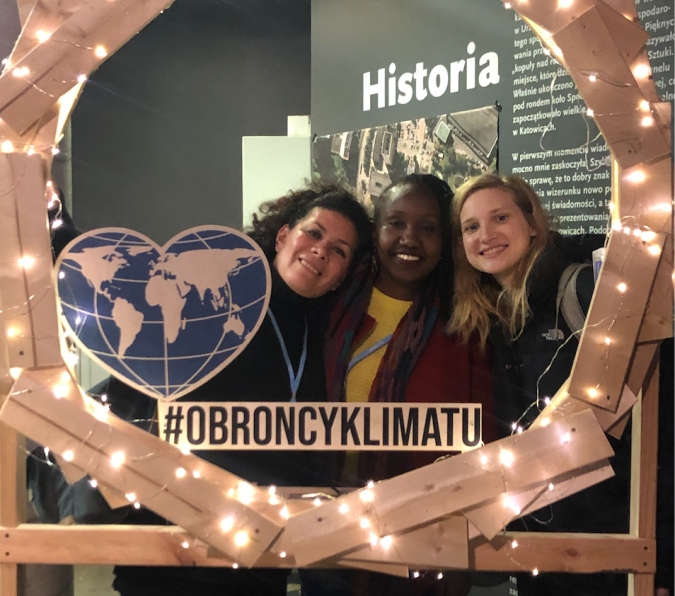
WECAN International COP24 Delegates (left to right) Carmen Capriles, Ruth Nyambura, and Elaine Colligan
Carmen Capriles of La Paz, Bolivia started Reacción Climática in 2010, as a volunteer organization which aims to raise awareness about the impacts of climate change on the Andean region. She has actively participated in different U.N. processes like the 2030 Agenda for Sustainable Development, and the Paris Agreement, with special emphasis on women’s rights and gender equality – and most recently in the Escazú Agreement, advocating for Environmental Defenders. Carmen holds a degree from Bolivia as an Engineer in Agriculture, as well as a degree in Sustainable Rural Development from Egypt. She is an honored member of WECAN International’s Advisory Council.
Ruth Nyambura is a Kenyan feminist who works on the intersections of gender, economy and ecological justice. Her organizing and research interests are on the agrarian political economy of Africa, the rural-urban movements resisting the corporatization of Africa’s food systems and the neoliberal turn as a whole.
Elaine Colligan is an activist and organizer passionate about gender and climate justice. Originally from Seattle, Washington, U.S., she is currently reading for the Masters in Philosophy in Political Theory at the University of Oxford. Before coming to Oxford, she co-directed a political action committee, “Clean Virginia” and worked on former U.S. congressman Tom Perriello’s gubernatorial campaign, advocating against two fracked gas pipelines and for a $15/hour minimum wage. Elaine began her career in U.S. politics through working with 350 Action on the 2016 presidential election, organizing students and youth to talk to presidential candidates about climate change. She has also conducted research on gender and climate change in Djirnda, Senegal. Elaine is proud to be part of the WECAN family, having assisted on a variety of projects throughout the years, including the recently-launched “Women Speak” project. She is deeply invested in promoting climate justice as a framework to understand and approach the climate crisis, which prioritizes the needs and solutions of people living on the frontlines of climate change, in particular women and Indigenous peoples.
Background Context:
The Paris Agreement and The “Rulebook”
At a time when governments continue to fail to act on clear scientific warnings that we must rapidly transition away from fossil fuels, women are offering an alternative vision of how humans can live sustainably on this planet, in harmony and with respect for one another and the natural world. Although the U.N. process has lagged far behind the policies that women, frontline and Indigenous communities, and communities of color, who have been fighting environmental injustice and resisting colonial oppression for centuries, know we need to adopt, WECAN International remains committed to presenting at the COP in order to uplift real solutions and real leadership in a context in which these perspectives and leadership are urgently lacking.
From December 2nd to 14th, 2018, heads of state and country negotiators from around the world met at COP24 with a focus on determining the “Paris Rulebook”, the implementation guidelines of the Paris Agreement. Adopted in 2015, the Paris Agreement replaced the Kyoto Protocol with an ambitious global vision of keeping warming well below 2°Celsius.
After having achieved worldwide consensus on a 2°Celsius warming ceiling, now the Intergovernmental Panel on Climate Change’s Special Report on Global Warming of 1.5° Celsius has issued the loudest clarion call yet for a stronger, 1.5°Celsius target, highlighting the enormous benefits of keeping warming under 1.5, as opposed to 2 degrees. WECAN International, early on and for many years, has demanded this 1.5 degree goal, or even lower, to truly address the crisis at hand.
Most impacted populations, including women, coastal and small-island communities, Indigenous peoples, and farmers would be exposed to far less economic, health, and security risks under a 1.5°Celsius scenario. In fact, the IPCC estimates that “limiting global warming to 1.5°C, compared with 2°C, could reduce the number of people both exposed to climate-related risks and susceptible to poverty by up to several hundred million by 2050.” Much lower risks are also projected at 1.5°C for heat-related morbidity, mortality and infectious diseases, as well as species extinction, loss of biodiversity, and the irreversible decimation of forests, oceans, wetlands and tundras worldwide.
Critically, the 1.5° Celsius target also falls more in-line with urgent calls from frontline, Indigenous, people of color, and Global South communities who have made clear that action, or inaction, to meet these targets will greatly impact their ability to survive and thrive. A 1.5° Celsius target would also require an immediate halt to all new fossil fuel extraction, mining and drilling, as demanded by people’s movements for climate justice around the globe. The report states that global net anthropogenic CO2 emissions must “decline by about 45% from 2010 levels by 2030” (Summary for Policymakers, page 14).
Glaringly, current country commitments to reduce carbon emissions (“nationally determined contributions”) simply don’t add up to a 1.5°Celsius world. Current plans to reduce emissions need to be tripled to keep warming below 2°Celsius, and increased fivefold to ensure warming does not overtake 1.5°Celsius.
Furthermore, monitoring those commitments every five years in what the United Nations calls a “global stocktake” will require a complex accounting process. Rich countries, notably the United States, have continued to skirt the topic of their insufficient commitments to cut carbon, and their historical responsibilities, by pushing for universal emissions reporting standards. The mobilization of significant finance from rich countries to ‘developing’ nations for loss and damages from climate change is another process around which many wealthy nations, including the United States, have continued to avoid responsibility. This is another critical reason that the demands and presence of the grassroots movement for climate justice is deeply needed each year at the U.N. climate talks.
Another major issue of contention at this year’s COP revolved around implementing respect for human rights, equity, and the principle of “common but differentiated responsibilities” in emissions reductions plans. The Katowice rulebook coming out of COP24, however, does not enshrine these rights in the implementation process, choosing instead to simply include references to the Paris Agreement preamble, which itself only motions to respecting women’s rights, human rights, Indigenous peoples’ rights and public participation in implementing national plans to cut emissions.
Women’s Leadership in Katowice
From delivering high-level interventions with the UNFCCC Women and Gender Constituency, to sharing local solutions at our Women’s Earth and Climate Action Network side event, WECAN International’s delegation to COP24 uplifted the power of women’s leadership at all levels of climate mitigation and adaptation, fossil fuel resistance, frontline solutions, and efforts to chart a way forward with a just transition framework.
While closely tracking the negotiation of the Paris Rulebook, with an eye towards gender at all levels and the rights of Indigenous peoples, WECAN International also spent time movement-building with young leaders and women leaders from across the global climate justice movement.
Key Highlights:
- Participation in the Women and Gender Constituency
Each day, members of WECAN International’s delegation participated in the Women and Gender Constituency morning caucus meetings to track the negotiations from a women’s rights perspective and advocate for shared priorities.
The key policy priorities included: mainstreaming gender throughout the Paris Rulebook, notably maintaining references to gender, Indigenous and human rights in country emissions reductions plans; operationalizing a robust platform for Indigenous peoples and local communities, to respect the rights to free, prior and informed consent (FPIC) in regards to adaptation and mitigation activities that occur in Indigenous territories; scaling up finance for loss and damage in vulnerable countries; rejecting market-based mechanisms such as the Clean Development Mechanism and carbon offsets trading in the Paris Sustainable Development Mechanism; mainstreaming rights in the Koronivia Joint Work on Agriculture; and promoting a just transition for workers and women.
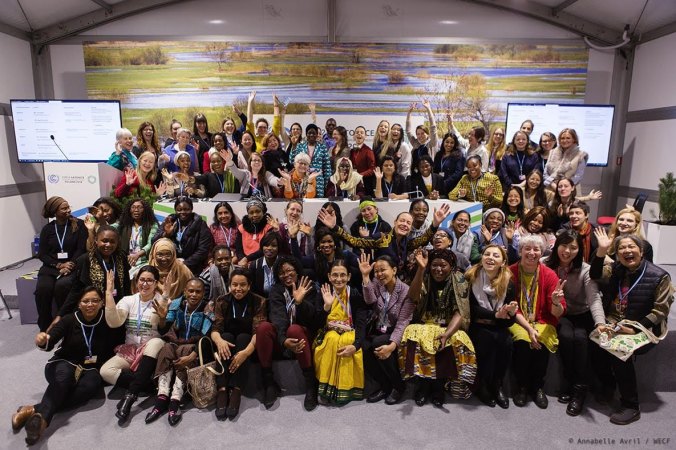
Members and allies of the UNFCCC Women and Gender Constituency – Photo via: Annabelle Avril/WECF
On Monday, 12/10, WECAN International Delegate, Elaine Colligan, had the opportunity to attend the Ad Hoc Working Group on the Paris Agreement Co-chairs’ Dialogue with Observers Organisations with Hwei Mian Lim, Senior Programme Officer at the Asian-Pacific Resource and Research Centre for Women (ARROW). Lim delivered a high-level comment on behalf of the Women and Gender Constituency in which she highlighted the absence of human rights language in the Paris Rulebook and asked for an update on status of integrating rights language. The Co-chairs responded that they took note of our concern regarding rights and the just transition, but frustratingly maintained that the COP negotiations are a process owned by Parties, and that in order to reach consensus among Parties there “need to be trade-offs.” This was very disappointing to hear, as it is our position, of course, that you can never “trade off” human or women’s rights!
Later in the day, Elaine collaborated with Chiara Soletti, Women, Rights and Climate Coordinator for the Italian Climate Network, to draft a question regarding why 12 activists were deported at the Polish border on their way to COP. We received the frightening answer from the Polish COP Presidency that these activists were refused entry for two reasons: they did not have a valid visa, or they were on a list of people who the Polish government has deemed a threat to the “public order.” The answer was very inadequate and exhibited the Polish government’s inclination to crack down on free speech and public activism during the COP.
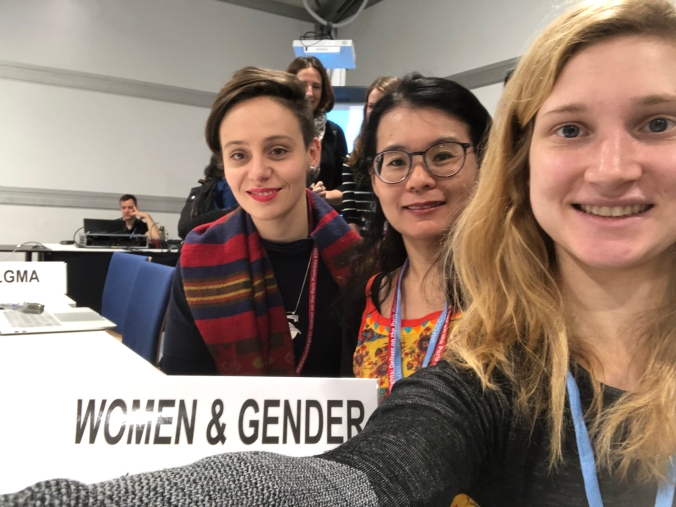
Chiara Soletti, Women, Rights and Climate Coordinator for the Italian Climate Network; Hwei Mian Lim, Senior Programme Officer at the Asian-Pacific Resource and Research Centre for Women (ARROW); and Elaine Colligan, WECAN International Delegate
During UNFCCC Gender Day at COP, Tuesday December 11th, WECAN International Delegates Ruth Nyambura and Elaine Colligan attended a side event hosted by the Climate Technology Centre & Network to foster dialogue between civil society groups and the UNFCCC on mainstreaming gender in technology adaptation and finance. Ruth Nyambura asked a powerful question regarding corporate capture of technology financing and highlighted the need for more grassroots access to technology grants in the U.N. Climate Technology Centre.
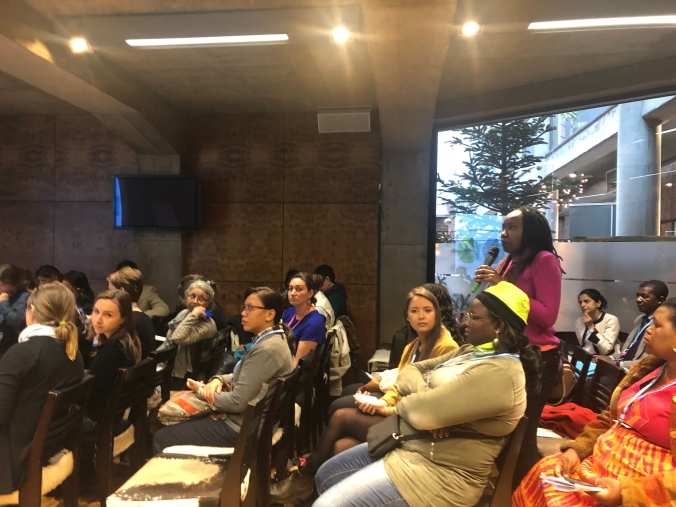
Ruth Nyambura speaks out during a session on technology access and gender – Photo via: Elaine Colligan
WECAN International Delegates Carmen Capriles and Elaine Colligan also attended Gender Day events such as the prize ceremony for the Gender Just Climate Solutions Award.
- Participating in the disruption of the US panel.
On Monday, December 10th, WECAN International delegate Elaine Colligan joined with climate movement allies to help disrupt the only official U.S. government panel at the entire climate conference.
Under the Trump administration, the United States has announced that it will shamefully leave the Paris Agreement in 2020. For the second year in a row, the country also hosted an event promoting fossil fuel extraction and nuclear energy, entitled “Innovative Technologies Spur Economic Dynamism.” The panel was even more troubling and ironic given that the US government released just weeks before the Fourth National Climate Assessment report, warning that climate change would threaten hundreds of thousands of lives and jobs in the U.S.
However, U.S. civil society groups at the COP refused to accept the egregious panel as a representation of the interests and goals of the country’s population. The disruption began when Jade Daniels, Communications Coordinator for the Grassroots Global Justice Alliance, ignited peals of theatrical laughing from the audience at the sheer absurdity of promoting fossil fuels at a time when the urgent transition to renewables in a must. Felicia Teter (Yakama Nation/U.S.) spoke about the impacts to Indigenous communities of climate change, saying “We hold the solutions and we know we must keep it in the ground.”
The group dropped a banner reading “Keep It In the Ground” and gave the floor to four leaders, two of which were women, who spoke about their work in the U.S. promoting a just transition away from fossil fuels. First, Leona Morgan (Navajo/Diné Leader, U.S.) discussed the deleterious impacts of fracking, drilling and uranium mining at the Navajo Nation. Then, Aneesa Khan (India/U.S., SustainUs Delegation Leader) called out our leaders for their lack of ambition on climate, as her homeland in Chennai, India experiences life-threatening floods.
See the livestream of the action here and learn more via action coverage in the Pacific Standard and other international publications.
- Walking out of UK/EU forum promoting natural gas.
On Tuesday, December 11th, WECAN delegates participated in a walkout of a panel hosted by natural gas lobby group GasNaturally. While Marco Alvera, the president of the group, was speaking, protesters silently stood up and filed out of the room. Afterwards, Rita Uwaka, a woman leader with Friends of the Earth Nigeria, spoke to reporters about the need to immediately halt fossil fuel extraction and drilling in the Niger River Delta.
- Powerful Women Leaders speak at WECAN International Side Event: ‘Women for Climate Justice Leading Solutions on the Frontlines of Climate Change’
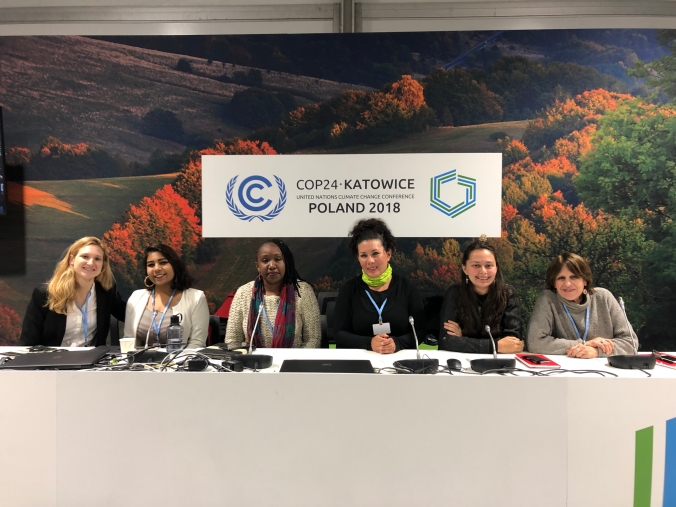
‘Women for Climate Justice’ COP24 event speakers (left to right): Elaine Colligan, Aneesa Khan, Ruth Nyambura, Carmen Capriles, India Logan-Riley, and Cynthia Mellon
On Wednesday, December 12th, six women leaders shared their analysis, experience, and vision as women for climate justice ,during WECAN International’s official COP24 side event ‘Women for Climate Justice Leading Solutions on the Frontlines of Climate Change’.
Speakers Carmen Capriles (Feminist, Human Rights and Environment Defender, Bolivia); Ruth Nyambura (Feminist, Organizer and Researcher, Kenya); Cynthia Mellon (Policy Coordinator, Climate Justice Alliance, Our Power Campaign, U.S.); India Logan-Riley (Ngati Kahungunu ki Heretaunga, Youth Climate Leader, Aotearoa/New Zealand); Aneesa Khan (COP24 Delegation Leader with SustainUS, U.S.); and Elaine Colligan (Organizer and Activist, Masters in Philosophy in Political Theory at Oxford, and Women’s Earth and Climate Action Network Programs Contributor, U.S.) – spoke out on many topics to address the need for climate justice and feminist based solutions to the climate crisis, including forest and biodiversity protection, Indigenous rights advocacy, agro-ecology implementation, fossil fuel resistance, and protection of women land defenders.
WATCH the full event via Facebook Live here or via the COP24 video streaming page here.
Carmen Capriles (Reaccion Climatica, Bolivia) spoke first, exploring the importance of the Escazu Agreement and the killing of environmental land defenders and Indigenous land defenders in Latin America. Adopted on March 4th, 2018 in Costa Rica, the Escazu Agreement is also known as the Regional Agreement on Access to Information, Public Participation and Justice in Environmental Matters. It is the first environmental treaty of Latin America and the Caribbean, enshrining Principle 10 of the Rio Declaration, and it establishes the right of access to information, public participation and justice in environmental matters. The treaty importantly protects the human rights of environmental land defenders, guaranteeing the right to freedom of expression and assembly for communities while encouraging accountability and prosecution for those that threaten the lives and livelihoods of activists.
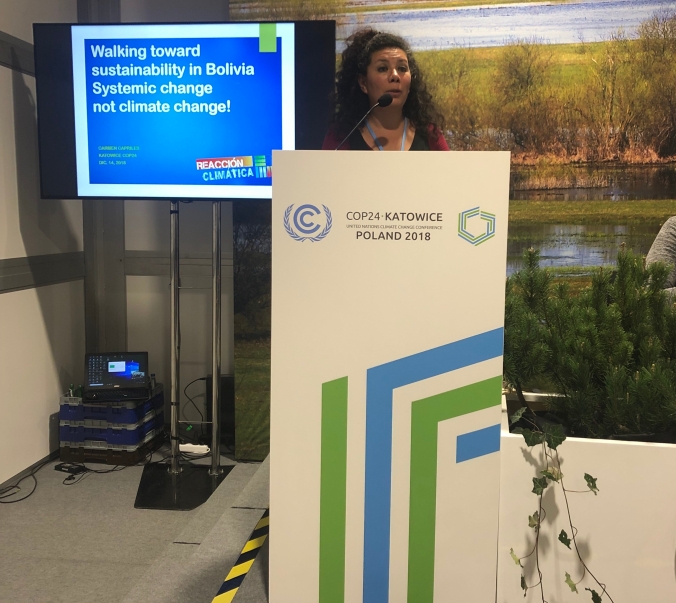
Carmen Capriles speaks out during the WECAN International COP24 side event
Carmen explained,
“Most of the killings of environmental land defenders are happening in Latin America and the Caribbean… All this blood of activists who want to take care of the resources, who want to take care of the Amazon, who want to take care of the rivers, just let it flow. And we can’t let this happen. In 2017 we had almost 200 environmental land defenders killed in Latin America. So in order to tackle this problem, we’ve been working on an institutional solution. Who are most affected by this persecution and harassment in the region are Indigenous people. Two out of three murders are of Indigenous people. Although we have lots of means and platforms for Indigenous voices, they do not get to these levels, and [the world] still does not value these voices.”
Next, Ruth Nyambura (Feminist, Organizer and Researcher from Kenya) spoke powerfully about activism in the streets and transnational global feminism from the Global South. Nyambura began her talk by quoting sociologist Asef Bayat (University of Illinois) on the topic of streets as spaces of politics. “Streets are spaces of flow and movements, are not only where people express grievances, but also where they fight identities and large solidarities, and extend their protests beyond their immediate circles, to include the unknown, strangers.”
She urged the audience to communicate beyond our narrow social circles in order to build global solidarity with people worldwide. Nyambura expressed solidarity with Polish movements for liberation, acknowledging the importance of transnational partnership and allegiance. She then argued that people from the Global South are constantly fighting for liberation from colonial Western mindsets, and it is the everyday leadership of women around the world, from the fields to the streets to the halls of the United Nations, that is charting a new way forward.
Poignantly, Ruth reflected during her presentation,
“Even in these difficult times, people are finding ways to resist authoritarianism and an economic system that finds us disposable, the majority of us being women, being queer people, being farmers… We have to conceive our work in movements as a deeply political project. This is not the time to say we are neutral, to bring everyone to the big tent. As feminists, women and environmental defenders, we have to know that our work will be contentious… We have to build our movements with the aspirations of those on the margins of pipelines, coal power plants, corporations in their territories, and center the aspirations of those on the frontlines of the crisis we face.”
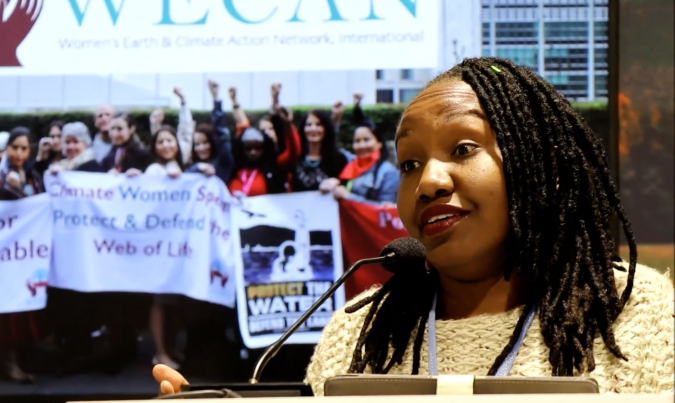
Ruth Nyambura speaks out during the WECAN International COP24 side event – Photo via: Climate Justice Alliance
India Logan-Riley (Ngāti Kahungunu ki Heretaunga/New Zealand and Indigenous Youth Delegation Leader to COP24) spoke next, beginning her talk with a Maori language greeting to the audience and “the land we stand on, the house that we are in, and the families present and not present in the room.”
India articulated her identity in the way she would at home, naming the mountain and river of her homeland and the boat that brought her ancestors to New Zealand from across the Pacific. She then shared an origin story from her people, saying that in Maori culture Mother Earth gifted the Red Earth to her child, God of the Forests, to craft the first human, and he crafted a woman. So the first human that walked the planet was a woman, and from her was born the Goddess of Death. In Maori culture women are both life-givers and life-receivers, who we enter the world through and leave the world through, and menstruation recalls the sacred connection with Red Earth.
Logan-Riley spoke powerfully,
“Of course, when Captain Cook arrived, and wrote some things down about Maori women, he changed that story. He demonized us, portrayed us as violent and uncivilized and hyper-sexualized, and that effectively dehumanized us as women, and the repercussions of that can still be seen in a lot of the narratives told about Maori women today. More often than not, if you come from a family that has a history of domestic violence, your child will be planned to be taken off you before the child is even born, and that rate is much higher for Maori women than non-Maori women.”
India discussed how women in New Zealand got the right to vote in 1893, but lamented that eight years ago New Zealand passed a law removing prisoners’ right to vote, effectively robbing many Maori women of political agency, and highlighted People Against Prisons Aotearoa as a solutions group advocating for prison abolition for people across different genders. Logan-Riley also spoke about the growing the Indigenous youth climate movement in New Zealand, where the fight against patriarchy and oppression continues and the need to promote women’s leadership is evermore urgent, as women perform gendered and emotional labor that is under-recognized and under-resourced. Over the past few years, Logan-Riley has been a recognized for leading an Indigenous youth climate delegation to the U.N. climate talks, the first of its kind. Most of the members have been women or gender non-conforming people.
Next, Aneesa Khan (SustainUs Delegation Leader, India/U.S.) spoke about her personal relationship to activism and the publication of her graphic novel, Praxis, about organizers of color and Global South climate leaders. She showed slides of her illustrations, that narrate her personal story in youth activism, and her fight against depression and burnout in activism.
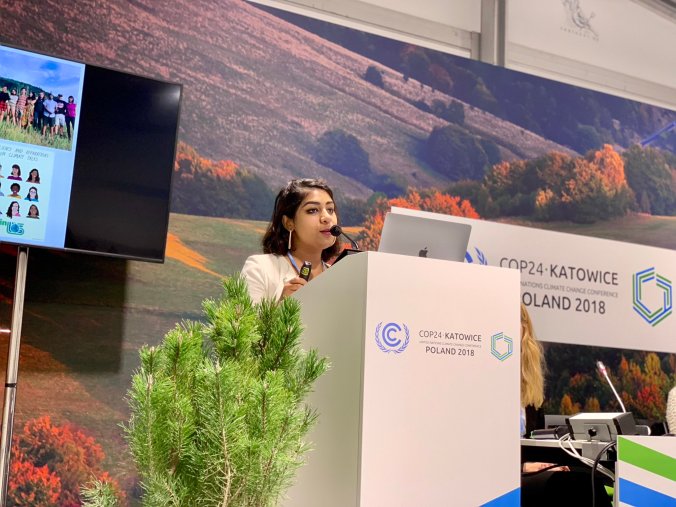
Aneesa Khan speaks out during the WECAN International COP24 side event – Photo via Twitter
Aneesa discussed growing up in Oman, where drilling for oil was cheaper than providing drinking water, and contrasted her up-front view of fossil fuel extraction to the climate devastation in the form of flooding and droughts that her family in Chennai, India experienced.
Aneesa explained,
“We live in a time of tipping points, as war, racism, poverty, and a plethora of other issues drive society as we know it over the edge, every single one of these problems is being exacerbated by the worst planetary crisis we have ever faced: climate change. I’m not the first one to feel burned out, nor am I the last. There are thousands of strong people struggling for just causes every single day, and they are here to inspire us and they are the ones who keep us going, not the UN, not the federal government, not the people who are pushing us down. The only way we make it through this is by finding our form of praxis.”
Cynthia Mellon (Policy Coordinator, Climate Justice Alliance and representative of the It Takes Root Delegation, U.S.) spoke about organizing for food sovereignty and energy democracy. She highlighted the work of members of the Climate Justice Alliance, an alliance of 68 different groups, in African-American, Latino, Asian and Pacific Islander, and poor white communities.
Cynthia explained,
“We believe as CJA that in order to effectively confront the climate crisis, we must transition our priorities from global systems of production and consumption that are energy-intensive and fossil fuel-dependent to more localized systems that are sustainable, resilient and regenerative. But to do this, this transition must be just.”
She discussed the It Takes Roots Delegation, composed of the Climate Justice Alliance, Right to the City, the Indigenous Environmental Network, and the Grassroots Global Justice Alliance, who bring the message of decolonial Indigenous liberation, women’s rights, queer liberation and economic justice to the halls of the United Nations.
Mellon also highlighted the feminist organizing in the Grassroots Global Justice Alliance, which holds feminist organizing schools and supports and trains feminist organizers of color. She then highlighted the work of the Black Farm Collective, whose members teach farming and food sovereignty to Black communities in the South, the Midwest and Puerto Rico. In particular, Organización Boricuá de Agricultura Ecológica is helping Puerto Rico to recover from Hurricane Maria by teaching agroecological farming methods to sustain and rebuild communities.
Mellon also uplifted the work of women-led organization in the San Francisco Bay Area, such as Urban Tilt, that are farming and teaching communities how to recover food sovereignty and local medicinal practices in the shadow of oil refineries that have a long history of polluting local communities. Furthermore, Cynthia shared the story of the Little Village Environmental Justice organization in Chicago, a women-led group, worked to close down two coal-fired power plants while developing a school that teaches people how to build and install solar panels, especially youth in the foster care system and people who have been incarcerated. She also uplifted the Asia-Pacific Environmental Network and the Black Mesa Water Coalition as organizations that are promoting the just transition, agroecology and local sustainable economies in their regions, with strong women and queer leaders at the forefront.
Finally, Elaine Colligan (WECAN Programs Contributor, U.S.) spoke about electoral organizing as global feminist solidarity and her work directing an anti-corruption, renewable energy Political Action Committee in Virginia.
She told her personal story about becoming politicized to working in U.S. politics through witnessing the impacts of climate change in Séerer communities in Djirnda, Région de Fatick, Senegal. Due to climate change, the traditional economic livelihoods of these communities were under stress from drought, sea level rise, biodiversity loss, and deforestation of the mangrove forest. This experience moved her to working to end the U.S. government’s close political ties with the fossil fuel industry and promote a just transition at home, in her country. She spoke about her work with 350 Action (the political arm of 350.org) training over 100 students and youth to talk presidential candidates about climate change during the 2016 election. Colligan said that even though Hillary Clinton didn’t win, young people were able to change the top-line priorities of the Democratic Party on climate change, as Clinton moved to supporting a ban on fossil fuel extraction on public lands by the end of the campaign. She then discussed her work as Deputy Director of Clean Virginia, a political action committee that funds candidates in the state of Virginia who refuse money from publicly regulated utilities.
After all the speakers had presented powerfully on their work, the women answered questions from the audience and spoke individually with researchers and reporters who were eager to interview each woman. The depth and breadth of analysis that the panel offered only echoed what study after study have shown: women’s leadership is central to climate solutions that prioritize communities and the natural world in a just transition to a sustainable future. Women are unwilling to compromise on human rights, gender equality, the rights of Indigenous peoples and the Rights of Nature, instead holding these values as central to a just transition and any climate solutions.
5. Interview with Magdalena Rozwadowska.
On Wednesday, December 12th WECAN International Delegate Elaine Colligan had the chance to sit down with Magdalena Rozwadowska, a Polish woman activist from the Lower Silesia Women’s Congress.
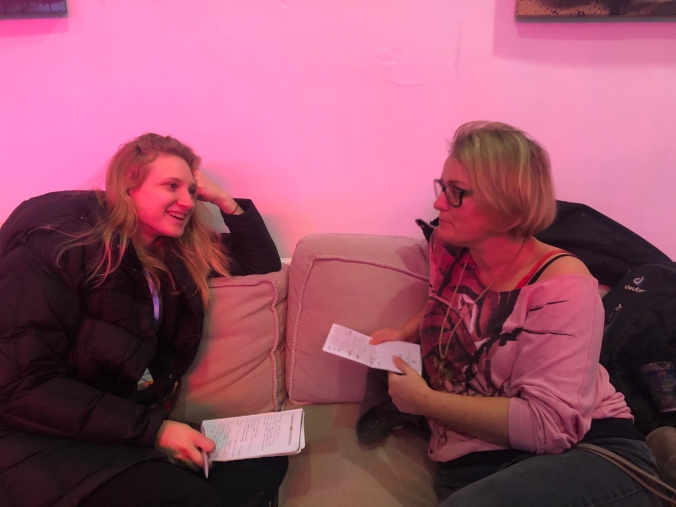
Rozwadowska discussed her work as part of this women’s organizing collective to oppose the destruction of the Białowieża old-growth forest, a UNESCO World Heritage site and biodiversity hotspot. Though she was not physically present at the action, she recounted how pictures of women breastfeeding their children on stumps elevated the issue to the European Commission, who then put pressure on the Polish government to halt the logging. She also discussed her work opposing the Polish government’s efforts to ban abortion, in which she took to the streets with hundreds of other women in a series of demonstrations that are slowly changing public opinion regarding women’s rights to their own bodies. Rozwadowska’s passion stems from her work keeping bees, through which she has seen how much biodiversity loss and climate instability impact local ecosystems.
The visit with Rozwadowska builds upon WECAN International’s effort to connect with local, frontline women leaders in each of the countries we visit during annual UNFCCC COP meetings. To learn more, please see our videos from powerful meetings and visits with women of the Hambach Forest resistance in Germany (during COP23) – and women farmers in Morocco (during COP22).
- Putting pressure on UK Member of Parliament Claire Perry.
On Thursday, December 13th, WECAN Delegate Elaine Colligan asked Claire Perry, a Conservative Member of Parliament (Devises) and Minister of State for Energy and Clean Growth, about the United Kingdom’s support for fracking in Lancashire and general reliance on natural gas. The Minister was speaking at a side event organized by the Powering Past Coal Alliance, a coalition of sub-national groups that encourage the transition away from coal but promote natural gas and the burning of biofuels as solutions. Along with the UK Youth Climate Coalition, WECAN helped to call out these false solutions in the transition away from coal and advocate for a 100% renewable, just energy transition. Colligan questioned Perry about her support for the continued use of natural gas in the UK in light of the IPCC report that calls for a rapid transition off of all fossil fuels. She received the unsatisfying and unjust answer that the UK would continue to open more fracking sites in Lancashire and consume natural gas at the same rate, despite the overwhelming science that the country needs to rapidly transition off of this dirty fuel. See video here.
- Uplifting and Urging the Implementation of the Escazú Agreement.
On Thursday December 13th, WECAN International Delegate Carmen Capriles organized and led an action calling for all Latin American and Caribbean countries to sign the Escazú Agreement to protect the human rights of environmental land defenders.
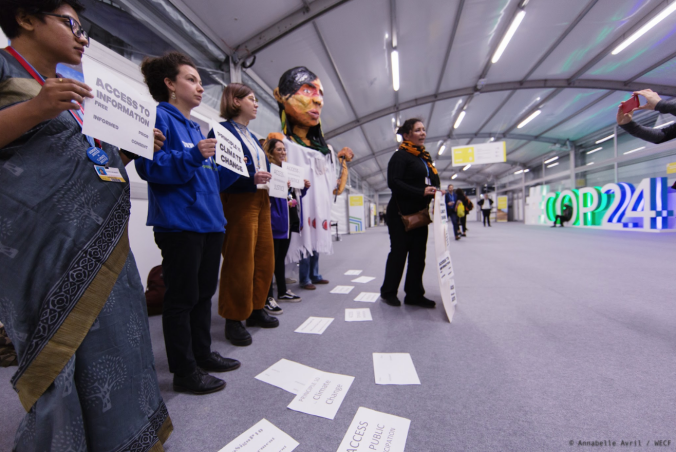
Carmen Capriles, WECAN COP24 Delegate and woman leader from Bolivia, takes action during COP to demand implementation of the Escazú Agreement. Photo credit: Annabelle Avril/WECF
The Escazú Agreement is a first-of-its-kind agreement between fourteen countries in Latin America and the Caribbean, which “enacts binding provisions for States to equip their citizens with information, judicial corrections and spaces for public participation in environmental matters concerning them.” The agreement aims to encourage governments to provide more transparency, accountability and judicial scrutiny on the civil and human rights of environmental defenders. Latin America and the Caribbean are the regions with the highest numbers of murders of environmental land defenders in the world, as reported by Global Witness. Please see the action livestream here.
- Mass Civil Society Action.
On Friday, December 14th, all WECAN International Delegates participated in a sit-in on the main steps of the COP conference center, to call for ramped-up commitments to transition rapidly off of fossil fuels and extreme energy, renounce false solutions, and center the leadership of grassroots, Indigenous and people of color-led initiatives.
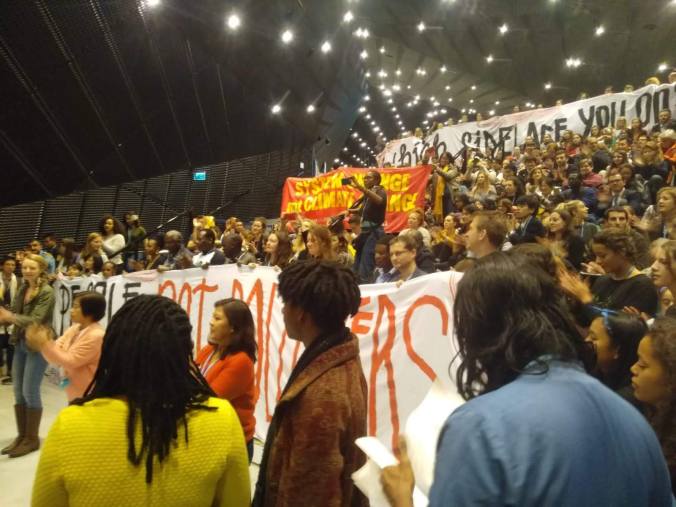
Mass civil society action on the final day of COP24 – Photo by Shaila Shahid
The action was organized and led by members of the Demand Climate Justice constituency whose comprehensive policy framework to achieve climate justice can be found in the People’s Demands for Climate Justice, for which the Women’s Earth and Climate Action Network is a signatory. Demand Climate Justice is a constituency whose membership is largely consists of organizations that hold a strong racial, Indigenous, economic and gender justice lens, and the Friday action was principally organized by the powerful leadership of Indigenous people, people of color and people from the Global South alongside global allies.
Over 200 people occupied the steps and dropped three banners reading, “System Change not Climate Change” “Whose side are you on?” and “Keep It In The Ground.” Rita Walker (Nigeria, Friends of the Earth International), Taily Terena (Brazil), and Hamangaí Pataxó (Pataxó Ha-Ha-Hãe, Brazil) spoke powerful words about Global South, Indigenous, youth, and women’s resistance to extraction and the need to rapidly transition to local, sustainable systems that center Indigenous peoples’ rights and knowledge. The action concluded with a silent walk-out to protest the killing of Indigenous and environmental land defenders. Livestream from WECAN Delegate Elaine Colligan here.
In the same two-week timespan as all of these actions, young people from the Sunrise Movement were risking arrest in droves in Speaker of the House Nancy Pelosi’s office, calling for the formation of a Select Committee to research a Green New Deal. The Green New Deal would be an economic stimulus package to transition the U.S. to 100% renewable energy by 2030 and provide a federal jobs guarantee at a living wage for all.
The Green New Deal is facing various hurdles and blockages, but has the support of newly elected representatives, including Representative Alexandria Ocasio Cortez (D-NY) and Senator Cory Booker (D-NY). Along with many movement allies, WECAN International supports this effort while keeping a keen, critical eye to ensure that the Green New Deal goes forward with a strong climate justice framework, which will be no easy task. To be effective, the Green New Deal must be protected from being co-opted by corporate agenda and false solutions such as carbon capture and storage, and instead remain grounded in frontline and Indigenous solutions and incorporate grassroots, people of color and Indigenous voices in the process of designing it from its inception.
Conclusions: The Power of Grassroots Voices for Climate Justice at the UNFCCC
In closing our time at COP24, WECAN International extends our gratitude to our strong delegation who contributed to ongoing efforts to bring the voices and solutions of frontline women to the forefront of climate talks, call out the influence of corporations and polluters, and advocate against false and inadequate solutions within the climate negotiations process. As the global climate justice movement made clear once again at COP24, all of our struggles are interwoven, and we can only succeed in addressing climate change when we center the leadership of Indigenous Peoples, women, and frontline, most-impacted communities.
Unfortunately, at the close of talks, there remains a great frustration with ongoing stagnancy and lack of ambition by many nations; and a lack of implementation of policies which respect human rights and center frontline communities and community-led solutions.
Yet, it is vital that we ongoingly participate in the UNFCCC process to demand that governments commit to action that is commensurate with the urgency of what global scientists, Indigenous peoples, and community leaders are telling us. The Women’s Earth and Climate Action Network and movements of people will not stop fighting for our beautiful Mother Earth and the health and justice of our communities, and now we return home to continue our work on the ground. Our collective efforts at the local, regional, national and international levels could not be more urgent, and our courage to act boldly and fiercely could not be more needed.
